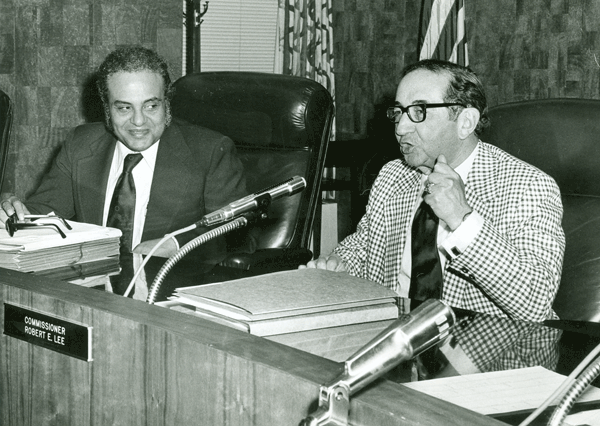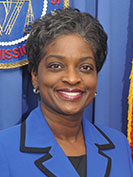The Relentless Advocate: Benjamin Hooks’ Historical Tenure at the Federal Communications Commission
By Mignon L. Clyburn
 As a longtime member of the Federal Communications Commission (FCC), I was guided
by three simple, objective principles: facts are facts, economics is economics, and
public interest is public interest. I firmly believe, however, that our approach to
these principles is often colored by our experiences. Those experiences shape the
way we stand for and remain behind the policies we implement. During my eight-plus
years walking through the doors of the FCC my experiences as an African American,
a woman, and as a South Carolina native whose mother and father met while jailed for
civil disobedience during the Civil Rights Movement influenced my steps.
As a longtime member of the Federal Communications Commission (FCC), I was guided
by three simple, objective principles: facts are facts, economics is economics, and
public interest is public interest. I firmly believe, however, that our approach to
these principles is often colored by our experiences. Those experiences shape the
way we stand for and remain behind the policies we implement. During my eight-plus
years walking through the doors of the FCC my experiences as an African American,
a woman, and as a South Carolina native whose mother and father met while jailed for
civil disobedience during the Civil Rights Movement influenced my steps.
These unique parts of my identity cannot be separated from or denied by me. Nor should they be. I consistently looked at the issues that came across my desk through an intersectional lens, with an eye towards how people from various socioeconomic statuses, racial groups, gender identities and educational backgrounds were impacted by our policies. I unapologetically strove to be altruistic for I know that every decision we made impacted consumers, small businesses and other key stakeholders.
But I did not come to this intersection all on my own. Those who came before are to be credited and acknowledged. They are the ones who created this paradigm on how to view and fight for intersectional policies. One of those key leaders was Rev. Benjamin L. Hooks, the first African American FCC commissioner.
Appointed in July 1972 by President Richard M. Nixon, Commissioner Hooks grabbed the mantle when it came to advocating for African-American ownership of broadcast stations; increasing employment of people of color in the communications industry; pushing for change in how black people were portrayed on television, and yes, increasing the numbers of diverse hires at the commission.
When Commissioner Hooks walked through the doors of the FCC, there were no African American-owned commercial television stations in the United States. In fact, the first -- WGPR-TV in Detroit -- began broadcasting during Commissioner Hooks’ tenure. In a 1974 interview with the Baltimore Afro-American newspaper, he stated that “money is the biggest hurdle for black station owners.” Forty-plus years later, this remains the case. According to the commission’s most recent media ownership report, there were twelve full-power (the ability to broadcast up to 100 miles) black-owned commercial television stations as of 2015. That is only ten more than in 1974. During Commissioner Hooks’ tenure tax breaks to entities that sold broadcast stations to members of the minority community were expanded, which increased the number of broadcast stations owned by marginalized groups by the largest rate in history. Unfortunately, the repeal of this incentive has set ownership efforts back by decades.
It pains me to say that my grip on the baton Commissioner Hooks passed became shakier with each passing year. Advocating both for more access to capital and a revamping of a tax-certificate program for marginalized populations continued because it is unfathomable that African Americans, who make up roughly 13 percent of the U.S. population, today own less than 21 percent of full-power commercial television stations. Efforts to increase diversity and inclusion in the media marketplace have been tenuous at best as reflected by the appalling numbers in the quickly growing Latino community, which owns only 4.5 percent of full-power commercial stations even though they make up 17 percent of the population. Our move towards becoming a majority-minority society is clearly not reflected in our vast media landscape.
“It is becoming increasingly important that blacks be involved in positions of responsibility and ownership,” Commissioner Hooks once stated. He firmly believed that people of color should have a role in shaping the news agenda, for he knew this was a sure way of ensuring a more accurate depiction of non-majority groups in the press. He spoke those words in the 1970s, but they still ring true today.
When I met Commissioner Hooks and his faithful life-partner, Frances Dancy Hooks, in the Charleston, South Carolina NAACP office in the mid-1980s, I do not think that I fully grasped just how much of a contribution he was making to our country. He had the audacity to challenge the organization that employed him. He risked alienating the media enterprises that could crush him in the public’s eye. Commissioner Hooks held regulated industries and the regulator he represented to the same high standards. The FCC set up a communications law seminar for two hours’ credit for junior and senior law students at Howard University because of Commissioner Hooks’ advocacy. There was an increase in internships for black Howard University law students, which was unprecedented in communications law at the time. Commissioner Hooks also delivered several public addresses about the importance of diversity in high level positions at the commission.
There is so much more that can be said about the legacy of this brilliant activist who fought for historically disenfranchised communities both inside and outside the FCC. He was an incredible orator. A preacher’s preacher. A civil rights leader. But my singular hope is no matter our ascribed or avowed descriptions of him that we will continue to revere Dr. Hooks as a premier leader for justice and equity. I am thankful for the progress he promoted. I am grateful for the duties he fulfilled. In the spirit of what this incredible Memphian has done for each of us, the next generation of leaders is counting on us to pave intersections for them to travel. Just like Dr. Benjamin Lawson Hooks, we must deliver.
 Mignon Clyburn, nominated by President Obama, served on the Federal Communications
Commission from 2009 until April 2018.
Mignon Clyburn, nominated by President Obama, served on the Federal Communications
Commission from 2009 until April 2018.
